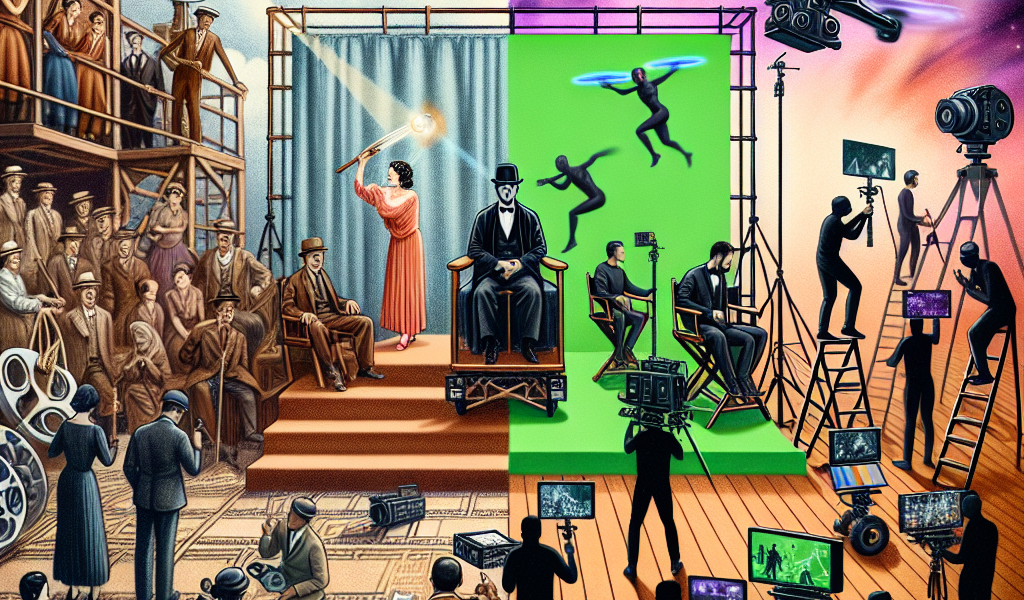-
Table of Contents
“Revolutionizing Entertainment: The Digital Age Unleashed”
Introduction

The Impact of Technology on the Entertainment Industry
The entertainment industry has undergone a profound transformation over the past few decades, driven largely by rapid advancements in technology. From the way content is created and distributed to how audiences consume and interact with media, technology has reshaped every facet of the entertainment landscape. Innovations such as digital streaming, virtual reality, and artificial intelligence have not only enhanced the quality and accessibility of entertainment but have also democratized content creation, allowing independent artists and smaller studios to reach global audiences. This technological evolution has led to a more immersive and personalized entertainment experience, fundamentally altering traditional business models and paving the way for new forms of storytelling and audience engagement. As technology continues to evolve, its impact on the entertainment industry is likely to grow, offering exciting possibilities and challenges for creators, consumers, and industry stakeholders alike.
The Evolution of Streaming Services and Their Influence on Traditional Media
The entertainment industry has undergone a seismic shift over the past decade, largely driven by the rapid evolution of technology. At the forefront of this transformation are streaming services, which have not only revolutionized how we consume media but have also significantly influenced traditional forms of entertainment. As we delve into the impact of these changes, it becomes clear that the landscape of entertainment is more dynamic and accessible than ever before.
Initially, the advent of streaming services like Netflix, Hulu, and Amazon Prime Video introduced a new way for audiences to access content. Unlike traditional television, which required viewers to adhere to a fixed schedule, streaming platforms offered the convenience of on-demand viewing. This shift allowed consumers to watch their favorite shows and movies whenever and wherever they wanted, fundamentally altering viewing habits. Consequently, the concept of “binge-watching” emerged, where entire seasons of shows could be consumed in one sitting, a phenomenon that traditional media could not easily accommodate.
Moreover, the rise of streaming services has democratized content creation and distribution. Independent filmmakers and smaller production companies now have a viable platform to showcase their work without the need for major studio backing. This has led to a more diverse array of content, catering to niche audiences that were previously underserved by mainstream media. As a result, viewers have access to a broader spectrum of stories and perspectives, enriching the overall entertainment experience.
However, the influence of streaming services extends beyond just content consumption. Traditional media companies have been compelled to adapt to this new reality. Major networks and cable providers have launched their own streaming platforms, such as Disney+ and HBO Max, in an effort to retain their audience base. This has led to a highly competitive market, where content is king, and exclusive deals and original programming are crucial for attracting and retaining subscribers. The competition has spurred innovation, with companies investing heavily in high-quality productions and cutting-edge technology to enhance the viewer experience.
In addition to reshaping the business model of traditional media, streaming services have also impacted advertising strategies. With the ability to skip commercials and the rise of ad-free subscription models, advertisers have had to rethink their approach. Product placements and integrated marketing within shows have become more prevalent, ensuring that brands can still reach their target audiences in a less intrusive manner. This shift has led to more creative and subtle forms of advertising, which can be more engaging for viewers.
Furthermore, the global reach of streaming platforms has broken down geographical barriers, allowing content to transcend borders more easily. International shows and films have found new audiences worldwide, fostering a greater appreciation for diverse cultures and storytelling styles. This cross-pollination of ideas has enriched the global entertainment landscape, making it more inclusive and interconnected.
While the rise of streaming services has undoubtedly brought numerous benefits, it has also posed challenges for traditional media. Declining cable subscriptions and lower television ratings have forced networks to rethink their strategies and adapt to the changing environment. However, this evolution has also opened up new opportunities for collaboration and innovation, ensuring that the entertainment industry continues to thrive in this digital age.
In conclusion, the impact of technology on the entertainment industry, particularly through the evolution of streaming services, has been profound. It has transformed how we consume content, democratized media production, and forced traditional media to innovate. As we move forward, it will be fascinating to see how these trends continue to shape the future of entertainment, offering even more exciting possibilities for creators and audiences alike.
Virtual Reality: Transforming the Audience Experience in Entertainment
Virtual reality (VR) is revolutionizing the entertainment industry, offering audiences an immersive experience that was once the stuff of science fiction. As technology continues to advance at a rapid pace, VR is becoming more accessible and sophisticated, transforming how we consume and interact with various forms of entertainment. This shift is not only changing the way content is created but also how it is experienced, providing a new level of engagement that traditional media simply cannot match.
One of the most significant impacts of VR in entertainment is its ability to transport users to entirely new worlds. Whether it’s exploring a fantastical landscape in a video game or stepping into the shoes of a character in a movie, VR allows for a level of immersion that makes the audience feel like an active participant rather than a passive observer. This heightened sense of presence can evoke stronger emotional responses, making the experience more memorable and impactful.
Moreover, VR is breaking down the barriers between different forms of entertainment. For instance, the lines between video games and movies are becoming increasingly blurred as VR experiences often incorporate elements of both. Interactive storytelling is gaining traction, allowing users to influence the narrative based on their actions and decisions. This convergence of media forms is fostering innovation and creativity, leading to the development of unique content that pushes the boundaries of traditional entertainment.
In addition to enhancing the audience experience, VR is also providing new opportunities for creators. Filmmakers, game developers, and artists are exploring the potential of VR to tell stories in ways that were previously unimaginable. The ability to create fully immersive environments opens up a new realm of possibilities for storytelling, enabling creators to experiment with different perspectives and narrative techniques. This creative freedom is leading to the emergence of groundbreaking content that challenges conventional norms and captivates audiences in novel ways.
Furthermore, VR is making entertainment more accessible to a wider audience. With the proliferation of affordable VR headsets and the increasing availability of VR content, more people are able to experience the magic of virtual reality. This democratization of technology is allowing individuals from diverse backgrounds to engage with and contribute to the VR landscape, fostering a more inclusive and vibrant entertainment ecosystem.
However, the rise of VR in entertainment is not without its challenges. There are concerns about the potential for addiction and the impact of prolonged VR use on mental and physical health. Additionally, the high cost of producing high-quality VR content can be a barrier for smaller creators and studios. Despite these challenges, the potential benefits of VR in entertainment are undeniable, and the industry is actively working to address these issues through research and innovation.
As VR technology continues to evolve, its impact on the entertainment industry is likely to grow even more profound. The possibilities for creating immersive, interactive experiences are virtually limitless, and we are only beginning to scratch the surface of what VR can achieve. By embracing this technology, the entertainment industry is poised to enter a new era of creativity and engagement, offering audiences experiences that are more immersive, interactive, and emotionally resonant than ever before. In this rapidly changing landscape, one thing is certain: virtual reality is here to stay, and its influence on entertainment will continue to expand, transforming the way we experience and enjoy content for years to come.
The Role of Artificial Intelligence in Content Creation and Personalization
Artificial intelligence (AI) has become a transformative force in the entertainment industry, revolutionizing the way content is created and personalized for audiences. This technological advancement has not only streamlined production processes but also enhanced the viewer experience by tailoring content to individual preferences. As AI continues to evolve, its role in the entertainment sector is becoming increasingly significant, offering both opportunities and challenges.
One of the most notable impacts of AI in content creation is its ability to generate new and innovative material. For instance, AI algorithms can analyze vast amounts of data to identify trends and patterns, which can then be used to develop storylines, scripts, and even entire movies. This data-driven approach allows creators to produce content that resonates with audiences on a deeper level. Moreover, AI-powered tools can assist in editing and post-production, making these processes more efficient and cost-effective. By automating repetitive tasks, AI frees up creative professionals to focus on more complex and imaginative aspects of their work.
In addition to content creation, AI plays a crucial role in personalizing the entertainment experience for viewers. Streaming platforms like Netflix and Spotify use sophisticated AI algorithms to analyze user behavior and preferences. These algorithms can recommend movies, TV shows, and music that align with individual tastes, thereby enhancing user satisfaction. This level of personalization not only keeps audiences engaged but also helps platforms retain subscribers in a highly competitive market. Furthermore, AI can predict what type of content will be popular in the future, enabling companies to invest in projects with a higher likelihood of success.
Transitioning from content creation to personalization, it is important to note that AI’s capabilities extend beyond mere recommendations. Interactive AI technologies, such as chatbots and virtual assistants, are increasingly being integrated into entertainment platforms. These tools can engage users in real-time conversations, providing personalized suggestions and even creating interactive story experiences. For example, AI-driven video games can adapt to a player’s skill level and preferences, offering a more immersive and enjoyable experience. This level of interactivity not only captivates audiences but also fosters a deeper connection between the user and the content.
However, the integration of AI in the entertainment industry is not without its challenges. One of the primary concerns is the potential loss of jobs due to automation. As AI takes over tasks traditionally performed by humans, there is a growing fear that many creative professionals may find themselves out of work. Additionally, there are ethical considerations regarding the use of AI in content creation. Questions about originality and authenticity arise when machines generate material that mimics human creativity. Ensuring that AI-generated content respects intellectual property rights and maintains artistic integrity is a complex issue that the industry must address.
Despite these challenges, the benefits of AI in the entertainment industry are undeniable. By enhancing content creation and personalization, AI is helping to deliver more engaging and relevant experiences to audiences worldwide. As technology continues to advance, it is likely that AI will play an even more integral role in shaping the future of entertainment. Embracing this change while addressing its associated challenges will be key to harnessing the full potential of AI in this dynamic and ever-evolving industry.
Conclusion
The impact of technology on the entertainment industry has been profound and multifaceted, revolutionizing the way content is created, distributed, and consumed. Advances in digital technology have enabled high-quality production techniques, enhanced special effects, and more immersive experiences through virtual and augmented reality. The rise of streaming platforms has disrupted traditional distribution models, offering consumers unprecedented access to a vast array of content on-demand. Social media and digital marketing have transformed promotional strategies, allowing for more targeted and interactive engagement with audiences. Overall, technology has democratized content creation, expanded global reach, and personalized user experiences, fundamentally reshaping the landscape of the entertainment industry.





